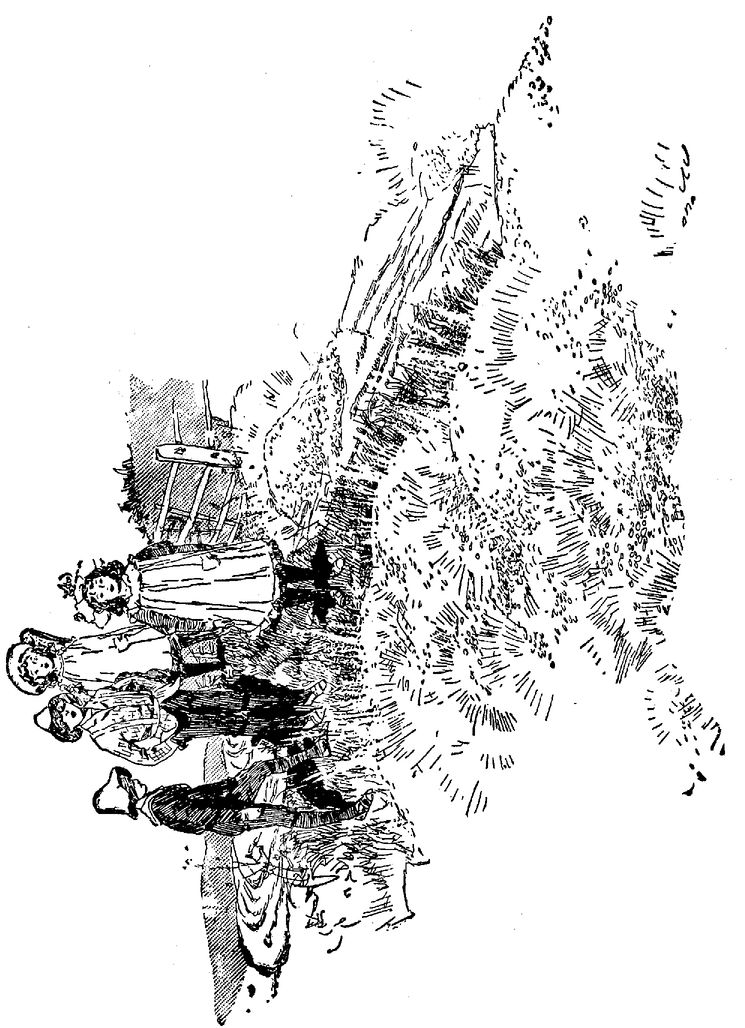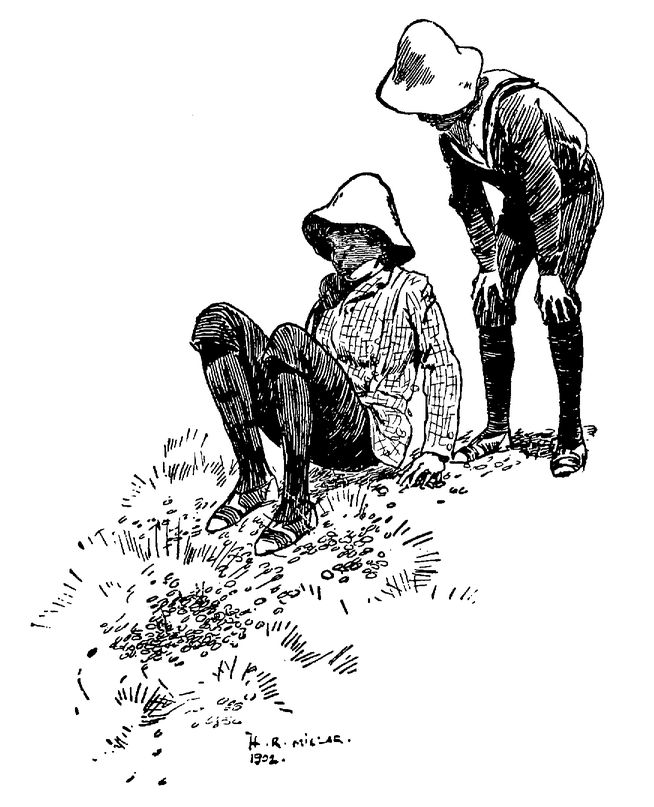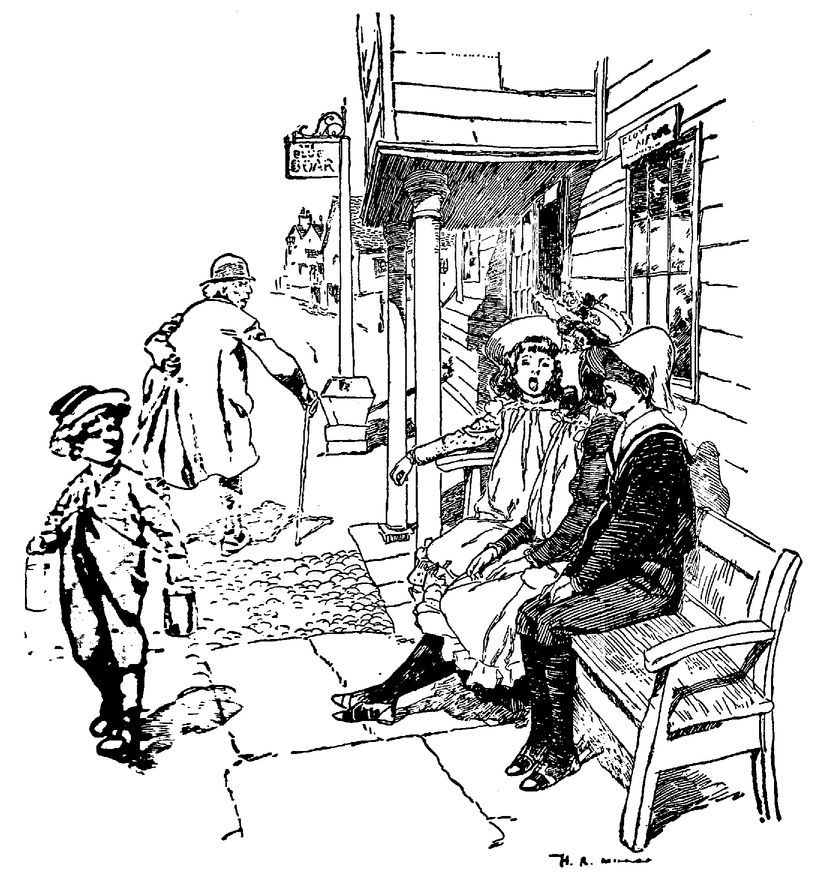Enchanted Castle and Five Children and It (Barnes & Noble Classics Series) (9 page)
Read Enchanted Castle and Five Children and It (Barnes & Noble Classics Series) Online
Authors: Edith Nesbit

BOOK: Enchanted Castle and Five Children and It (Barnes & Noble Classics Series)
2.33Mb size Format: txt, pdf, ePub
The Psammead sat up and shook the sand out of its fur.
“How’s your left whisker this morning?” said Anthea politely.
“Nothing to boast of,” said it, “it had rather a restless night. But thank you for asking.”
“I say,” said Robert, “do you feel up to giving wishes today, becausewe very much want an extra besides the regular one? The extra’s a very little one,” he added reassuringly.
“Humph!” said the Sand-fairy. (If you read this story aloud, please pronounce “humph” exactly as it is spelt, for that is how he said it.) “Humph! Do you know, until I heard you being disagreeable to each other just over my head, and so loud too, I really quite thought I had dreamed you all. I do have very odd dreams sometimes.”
“Do you?” Jane hurried to say, so as to get away from the subject of disagreeableness. “I wish,” she added politely, “you’d tell us about your dreams—they must be awfully interesting.”
“Is that the day’s wish?” said the Sand-fairy, yawning.
Cyril muttered something about “just like a girl,” and the rest stood silent. If they said “Yes,” then good-bye to the other wishes they had decided to ask for. If they said “No,” it would be very rude, and they had all been taught manners, and had learned a little too, which is not at all the same thing. A sigh of relief broke from all lips when the Sand-fairy said:
“If I do I shan’t have strength to give you a second wish; not even good tempers, or common sense, or manners, or little things like that.”
“We don’t want you to put yourself out at all about
these
things, we can manage them quite well ourselves,” said Cyril eagerly; while the others looked guiltily at each other, and wished the Fairy would not keep all on about good tempers, but give them one good rowing if it wanted to, and then have done with it.
these
things, we can manage them quite well ourselves,” said Cyril eagerly; while the others looked guiltily at each other, and wished the Fairy would not keep all on about good tempers, but give them one good rowing if it wanted to, and then have done with it.
“Well,” said the Psammead, putting out his long snail’s eyes so suddenly that one of them nearly went into the round boy’s eyes of Robert, “let’s have the little wish first.”
“We don’t want the servants to notice the gifts you give us.”
“Are kind enough to give us,” said Anthea in a whisper.
“Are kind enough to give us, I mean,” said Robert.
The Fairy swelled himself out a bit, let his breath go, and said—
“I’ve done
that
for you—it was quite easy. People don’t notice things much, anyway. What’s the next wish?”
that
for you—it was quite easy. People don’t notice things much, anyway. What’s the next wish?”
“We want,” said Robert slowly, “to be rich beyond the dreams of something or other.”
“Avarice,” said Jane.
“So it is,” said the Fairy unexpectedly. “But it won’t do you much good, that’s one comfort,” it muttered to itself. “Come—I can’t go beyond dreams, you know! How much do you want, and will you have it in gold or notes?”
“Gold, please—and millions of it.”
“This gravel-pit full be enough?” said the Fairy in an off-hand manner.
“Oh
yes
!”
yes
!”
“Then get out before I begin, or you’ll be buried alive in it.”
It made its skinny arms so long, and waved them so frighteningly, that the children ran as hard as they could towards the road by which carts used to come to the gravel-pits. Only Anthea had presence of mind enough to shout a timid “Good-morning, I hope your whisker will be better tomorrow,” as she ran.
On the road they turned and looked back, and they had to shut their eyes, and open them very slowly, a little bit at a time, because the sight was too dazzling for their eyes to be able to bear it. It was something like trying to look at the sun at high noon on Midsummer Day
o
For the whole of the sand-pit was full, right up to the very top, with new shining gold pieces, and all the little sand-martins’ little front doors were covered out of sight. Where the road for the carts wound into the gravel-pit the gold lay in heaps like stones lie by the roadside, and a great bank of shining gold shelved down from where it lay flat and smooth between the tall sides of the gravel-pit. And all the gleaming heap was minted gold. And on the sides and edges of these countless coins the midday sun shone and sparkled, and glowed and gleamed till the quarry looked like the mouth of a smelting furnace, or one of the fairy halls that you see sometimes in the sky at sunset.
o
For the whole of the sand-pit was full, right up to the very top, with new shining gold pieces, and all the little sand-martins’ little front doors were covered out of sight. Where the road for the carts wound into the gravel-pit the gold lay in heaps like stones lie by the roadside, and a great bank of shining gold shelved down from where it lay flat and smooth between the tall sides of the gravel-pit. And all the gleaming heap was minted gold. And on the sides and edges of these countless coins the midday sun shone and sparkled, and glowed and gleamed till the quarry looked like the mouth of a smelting furnace, or one of the fairy halls that you see sometimes in the sky at sunset.
The children stood with their mouths open, and no one said a word.
At last Robert stopped and picked up one of the loose coins from the edge of the heap by the cart-road, and looked at it. He looked on both sides. Then he said in a low voice, quite different to his own, “It’s not sovereigns.”
p
p
All the gleaming heap was minted gold

“It’s gold, anyway,” said Cyril. And now they all began to talk at once. They all picked up the golden treasure by handfuls, and let it run through their fingers like water, and the chink it made as it fell was wonderful music. At first they quite forgot to think of spending the money, it was so nice to play with. Jane sat down between two heaps of gold and Robert began to bury her, as you bury your father in sand when you are at the seaside and he has gone to sleep on the beach with the newspaper over his face. But Jane was not half buried before she cried out, “Oh, stop, it’s too heavy! It hurts!”
Robert said “Bosh!” and went on.
“Let me out, I tell you,” cried Jane, and was taken out, very white, and trembling a little.
“You’ve no idea what it’s like,” said she; “it’s like stones on you—or like chains.”
“Look here,” Cyril said, “if this is to do us any good, it’s no good our staying gasping at it like this. Let’s fill our pockets and go and buy things. Don’t you forget, it won’t last after sunset. I wish we’d asked the Sammyadd why things don’t turn to stone. Perhaps this will. I’ll tell you what, there’s a pony and cart in the village.”
“Do you want to buy that?” asked Jane.
“No, silly—we’ll
hire
it. And then we’ll go to Rochester and buy heaps and heaps of things. Look here, let’s each take as much as we can carry. But it’s not sovereigns. They’ve got a man’s head on one side and a thing like the ace of spades on the other. Fill your pockets with it, I tell you, and come along.You can jaw as we go—if you must jaw.”
hire
it. And then we’ll go to Rochester and buy heaps and heaps of things. Look here, let’s each take as much as we can carry. But it’s not sovereigns. They’ve got a man’s head on one side and a thing like the ace of spades on the other. Fill your pockets with it, I tell you, and come along.You can jaw as we go—if you must jaw.”
Cyril sat down and began to fill his pockets.
“You made fun of me for getting father to have nine pockets in my Norfolks,”
q
said he, “but now you see!”
q
said he, “but now you see!”
They did. For when Cyril had filled his nine pockets and his handkerchief and the space between himself and his shirt front with the gold coins, he had to stand up. But he staggered, and had to sit down again in a hurry.
“Throw out some of the cargo,” said Robert. “You’ll sink the ship, old chap. That comes of nine pockets.”
And Cyril had to.
He staggered, and had to sit down again

Then they set off to walk to the village. It was more than a mile, and the road was very dusty indeed, and the sun seemed to get hotter and hotter, and the gold in their pockets got heavier and heavier.
It was Jane who said, “I don’t see how we’re to spend it all. There must be thousands of pounds among the lot of us. I’m going to leave some of mine behind this stump in the hedge. And directly we get to the village we’ll buy some biscuits; I know it’s long past dinner-time.” She took out a handful or two of gold and hid it in the hollows of an old hornbeam.
r
“How round and yellow they are,” she said. “Don’t you wish they were gingerbread nuts and we were going to eat them?”
r
“How round and yellow they are,” she said. “Don’t you wish they were gingerbread nuts and we were going to eat them?”
“Well, they’re not, and we’re not,” said Cyril. “Come on!”
But they came on heavily and wearily. Before they reached the village, more than one stump in the hedge concealed its little hoard of hidden treasure. Yet they reached the village with about twelve hundred guineas
s
in their pockets. But in spite of this inside wealth they looked quite ordinary outside, and no one would have thought they could have more than a half-crown each at the outside. The haze of heat, the blue of the wood smoke, made a sort of dim, misty cloud over the red roofs of the village. The four sat down heavily on the first bench they came to. It happened to be outside the Blue Boar Inn.
s
in their pockets. But in spite of this inside wealth they looked quite ordinary outside, and no one would have thought they could have more than a half-crown each at the outside. The haze of heat, the blue of the wood smoke, made a sort of dim, misty cloud over the red roofs of the village. The four sat down heavily on the first bench they came to. It happened to be outside the Blue Boar Inn.
It was decided that Cyril should go into the Blue Boar and ask for ginger-beer, because, as Anthea said, “It is not wrong for men to go into public houses, only for children. And Cyril is nearer to being a man than us, because he is the eldest.” So he went. The others sat in the sun and waited.
“Oh, hats, how hot it is!” said Robert. “Dogs put their tongues out when they’re hot; I wonder if it would cool us at all to put out ours?”
“We might try,” Jane said; and they all put their tongues out as far as ever they could go, so that it quite stretched their throats, but it only seemed to make them thirstier than ever, besides annoying everyone who went by. So they took their tongues in again, just as Cyril came back with the ginger-beer.
“I had to pay for it out of my own two-and-seven-pence, though, that I was going to buy rabbits with,” he said. “They wouldn’t change the gold. And when I pulled out a handful the man just laughed and said it was card-counters.
t
And I got some sponge-cakes too, out of a glass jar on the bar-counter. And some biscuits with caraways in.”
t
And I got some sponge-cakes too, out of a glass jar on the bar-counter. And some biscuits with caraways in.”
The sponge-cakes were both soft and dry and the biscuits were dry too, and yet soft, which biscuits ought not to be. But the ginger-beer made up for everything.
“It’s my turn now to try to buy something with the money,” Anthea said; “I’m next eldest. Where is the pony-cart kept?”
It was at The Chequers, and Anthea went in the back way to the yard, because they all knew that little girls ought not to go into the bars of public-houses. She came out, as she herself said, “pleased but not proud.”
They all put their tongues out

“He’ll be ready in a brace of shakes,
u
he says,” she remarked, “and he’s to have one sovereign—or whatever it is—to drive us into Rochester and back, besides waiting there till we’ve got everything we want. I think I managed very well.”
u
he says,” she remarked, “and he’s to have one sovereign—or whatever it is—to drive us into Rochester and back, besides waiting there till we’ve got everything we want. I think I managed very well.”
“You think yourself jolly clever, I daresay,” said Cyril moodily. “How did you do it?”
“I wasn’t jolly clever enough to go taking handfuls of money out of my pocket, to make it seem cheap, anyway,” she retorted. “I just found a young man doing something to a horse’s leg with a sponge and a pail. And I held out one sovereign, and I said, ‘Do you know what this is?’ He said, ‘No,’ and he’d call his father. And the old man came, and he said it was a spade guinea; and he said was it my own to do as I liked with, and I said ‘Yes’; and I asked about the pony-cart, and I said he could have the guinea if he’d drive us in to Rochester. And his name is S. Crispin. And he said, ‘Right oh.’ ”
It was a new sensation to be driven in a smart ponytrap along pretty country roads; it was very pleasant too (which is not always the case with new sensations), quite apart from the beautiful plans of spending the money which each child made as they went along, silently of course and quite to itself, for they felt it would never have done to let the old innkeeper hear them talk in the affluent sort of way they were thinking. The old man put them down by the bridge at their request.
Other books
Alexis and the Lake Tahoe Tumult by Erica Rodgers
Grin by Keane, Stuart
The Project by Brian Falkner
The Nibelungenlied: The Lay of the Nibelungs (Oxford World's Classics) by Edwards, Cyril
The Pretty One by Cheryl Klam
The Doctor's Christmas by Marta Perry
Wild Card by Mark Henwick, Lauren Sweet
Untamed by Elizabeth Lowell
The Equalizer by Michael Sloan
Exceptional Service, Exceptional Profit: The Secrets of Building a Five-Star Customer Service Organization by Leonardo Inghilleri, Micah Solomon, Horst Schulze
